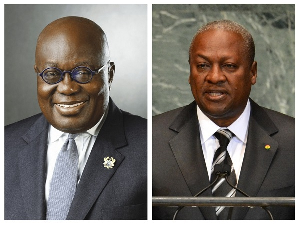In Honor of the Unknown “Lawyer”
By Dr. Samuel Adjei Sarfo
Under the first part of my article under this head, I argued that there is no animal known as African culture or Ghanaian culture for that matter, and that there is a legion of cultures unique to the communities and societies of Africa which, if we are so inclined, we can synthesize into a syncretic national or African one, only if we can agree as to which ones to select. There is not yet agreement as to our common humanity and ethnic equality. Our so-called African area scholars who are supposed to be the custodians of our cultural heritage are championing ethnic attrition as their daily stock in trade. How then can we agree on what constitutes a common African value, let alone culture? Thus the call for the return to Afrocentric culture is an exercise in futile abstraction, and the ululation of African epistemology is a rallying cry done in pursuit of a holy grail.
I received a virtual drubbing from commentators, many of whom questioned my Africanness, my self esteem and my mental health. But out of the general cacophony came a lonely voice that belonged to Moses, who rescued me from the oppression of the linguistic Pharoahs . Moses aptly wrote:
“SAS is certainly up to something but perhaps he has not exactly expressed (or described) it well. For one thing, he says there is nothing that can really be pinpointed at and called "African culture". He is right insofar as the different peoples of Africa have so many diverse ways and beliefs that it is useless to describe anything as "African culture".
If I understand SAS right, he is saying whatever knowledge system we have in Africa must be considered as part of human knowledge. One cannot therefore talk fruitfully of an African epistemology that is opposed to, or different from other systems of knowledge belonging to “other” people. It is on this ground that he challenges the Afrocentric enterprise especially as we have come to understand it from the writings of Kwarteng and Molefi that have inundated these pages of late. Perhaps these two guys have not been able to convince us (SAS in particular) that there is a knowledge system (Afrocentrism) which we Africans can take refuge in to assert and improve ourselves.
But, actually, SAS seems to have a far bigger project which, perhaps, is making it difficult for him to explain himself adequately here. SAS has, in all his articles for this site, fought assiduously against all ethnic dogmatism, sexual/gender discrimination, racial superiority and any other system that puts one set of people above the other. He has always called for unity of our peoples (in Ghana especially) and I see that it is to this extent that he is also calling for a one world where all human knowledge is put into one pot that belongs to the human race. Even if this is not so now, we should be pursuing that goal, rather than cutting ourselves away from the rest of humanity and creating a corner for ourselves.
I think he is right in many ways. It doesn't mean we should do away with whatever we may consider as our culture but rather to consider it as part of the culture of humanity. Globalization, which is increasingly integrating the world, seems to be bearing him out.
I was just wondering if SAS also thinks that once we start talking of Afrocentricism as “our” way, “our” approach, the next step will be saying “our” way is better than “your” way, resulting in the divisionism that he so much hates…
Let us see if the Afrocentrists can make a better case for themselves.”
I have been a lawyer for only three years, after my long stint as English Teacher both in Ghana and here in America. Being a teacher makes you do things for other people which could be akin to the work of god. But the messianic metaphor dawns even more cogently when one practices law. The law is a great instrument for the liberation of the oppressed. I remember last month, in a federal court here in Austin, a former soldier was brought to court in chains, accused of having violated his DWI terms of probation. He faced deportation to West Virginia to face the full rigor of the law within a hostile court. I made a long argument on his behalf, stating that the expensive car locking system the court was asking him to buy was premised on condition that he drove, and since he had not driven, he had broken no terms of his probation. The court agreed with me, and soon thereafter, that prisoner’s chain melted away. In sheer awe, he stood dumbfounded for a whole five minutes staring at me. Finally he said “I have never seen any lawyer defend his client the way you have defended me today. May God bless you.”
I am saying the same thing to Moses for his sagacious comment above: “I have never seen any lawyer defend his client the way you have done for me today. May God bless you.”
When I think of Moses, I am tempted to think of my good friend and brother Daniel Pryce. He is the only one on these pages capable of that kind of insight about me. Perhaps he was masquerading as Moses! But whatever the case, I do appreciate what he wrote, since it capsuled my inner intentions and transcended my thematic preoccupation. I cannot state my themes here in more succinct terms. I am merely adding the following as pointers to my innermost thoughts:
1. I am using the definition of culture in its broader context by applying it in a global sense. Many people still see it through a film darkly.
2. There is nothing wrong with an evolved culture which has universal applicability. It will be dangerous for our people’s minds to be ossified by adherence to archaic notions and practices being bandied about by over-zealous intellectuals who have no clue about the dark side of the cultures they profusely praise.
3. I never said Western beliefs and values should remain unquestioned, or that they must be swallowed hook, line and sinker. I said that whatever beliefs and values we cherish in the world have evolved with our full participation. In other words, we are also the makers and originators of the world’s civilization.
4. The danger in the notion some scholars assign to Afrocentrism--merely a call to focus on the need for Africans to rediscover who they are independent of their assimilated western values and ways of thinking and behaving-- although innocuous on its face, puts everybody in a box, effectively excluding the wealth of knowledge which we can freely access from the outside world.
5. I want to be seen as a human being with the corpus of world knowledge and technology available to me, not as a Ghanaian or African singing the swan song of moribund cultural practices founded on stupid superstitions.
6. To those with misgivings about my intentions and contributions to my society, I say, I was born and raised in Effiduase Koforidua in the Eastern Region of Ghana. Everyday, I stand in American courts here, both state and federal, to defend the poor and the needy, many of whom are our brothers and sisters being oppressed by the American system. I am also the leader of all the Ghanaians in Austin, Texas, daily attending to my people's needs. I am contributing my small part to the collective struggle of our people first as a Ghanaian, and also as a human being….
7. And by the way, if you think so-called African studies and epistemology serve any intellectual or practical purposes, consider that two foremost scholars who frequent these pages have Ph.Ds in this area and actually teach the subject here in America, and yet are the most intellectually bankrupt bigots here! So the question is: what purpose is served by imbibing theories that produce failed scholars like Akadu Mensema and Okoampa-Ahoofe?
The way forward for us is not to reconstruct an occlusionist culture, but to regard the world’s cultural corpus as the universal property of all the world’s citizens to be appropriated for our benefit without being concerned about its origins. This is because cultural ethos as we know them today are the eclectic creation of all humankind, not only of the Asian or Western or European world; they are actually the distillation, not the obnubilation or abnegation, of history’s norms and mores-- a conservation in human knowledge in which the societies of the world are joint creators and shareholders. Thus they belong in usufruct to all humanity, and we should be actively involved in conserving it, improving it, defending it and passing it on.
Samuel Adjei Sarfo, Doctor of Law, is a general legal practitioner in Austin, Texas. You can email him at sarfoadjei@yahoo.com










